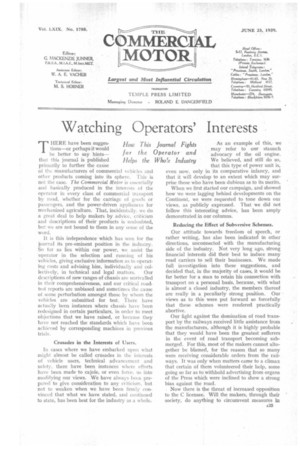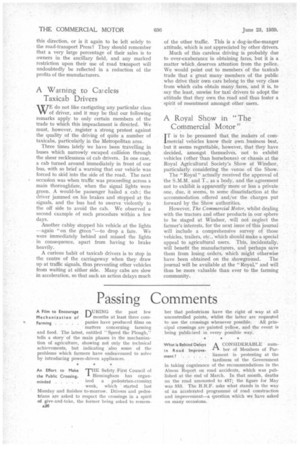Watching Operators' Interests
Page 27

Page 28

If you've noticed an error in this article please click here to report it so we can fix it.
THERE have been suggestions—or perhaps it would be better to say hints— that this journal is published primarily to further the cause of tlie manufacturers of commercial vehicles and other products coming into its sphere. This is not the case. The Commercial Motor is essentially and basically produced in the interests of the operator in every class of commercial transport by road, whether for the carriage of goods or passengers, and the power-driven appliances for mechanised agriculture. That, incidentally, we do a great deal to help makers by advice, criticism and descriptions of their products is undoubted, but we are not hound to them in any sense of the word.
It is this independence which has won for the journal its pre-eminent position in the industry. So far as lies within our power, we assist the 'operator in the selection and running of his vehicles, giving exclusive information as to operating costs and advising him, individually and col lectively, in technical and legal matters, Our descriptions of new ranges of chassis arc unrivalled in their comprehensiveness, and our critical roadtest reports are unbiased and sometimes the cause of some perturbation amongst those by whom the vehicles are submitted for test. There have actually been instances where chassis have been redesigned in certain particulars, in order to meet objections that we have raised, or because they have not reached the standards which have been achieved by corresponding machines in previous trials.
Crusades in the Interests of Users.
In cases where we have embarked upon what might almost be called crusades in the interests of vehicle users, technical advancement and safety, there have been instances where efforts have been made to cajole, or even force, us into modifying our views. We have always been prepared to give consideration to any criticism, but not to weaken when we have been firmly convinced that what we have stated, and continued to state, has been best for the industry as a whole. As an example of this, we may refer to our staunch advocacy of the oil engine. We believed, and still do so, that this type of power unit is, even now, only in its comparative infancy, and that it will develop to an extent which may surprise those who have been dubious as to its merits.
When we first started our campaign, and showed how we were lagging behind developments on the Continent, we were requested to tone down out views, as publicly expressed. That we did not follow this interesting advice, has been amply demonstrated in our columns.
Reducing the Effect of Subversive Schemes.
Our attitude towards freedom of speech, or rather writing, has also been indicated in other directions, unconnected with the manufacturing side of the industry. Not very long ago, strong financial interests did their best to induce many road carriers to sell their businesses. We made full investigation into these suggestions, and decided that, in the majority of cases, it would be far better for a man to retain his connection with transport on a personal basis, .because, with what is almost a closed industry, the members thereof are really in a peculiarly strong position. Our views as to this were put forward so forcefully that these schemes were rendered practically abortive.
Our fight against the domination of road transport by the railways received little assistance from the manufacturers, although it is highly probable that they would have been the greatest sufferers in the event of road transport becoming submerged. For this, most of the makers cannot altogether be blamed, for the reason that so many were receiving considerable orders from the railways. It was only when matters came to a climax that certain of them volunteered their help, some going so far as to withhold advertising from organs of the Press which were inclined to show a strong bias against the road.
Now there is the threat of increased opposition to the C licensee. Will the makers, through their society, do anything to circumvent measures in this direction, or is it again to be left solely to the road-transport Press? They should remember that a very large percentage of their sales is to owners in the ancillary field, and any marked restriction upon their use of road transport will undoubtedly be reflected in a reduction of the profits of the manufacturers.
A Warning to Ca;eless Taxicab Drivers
WEdo not like castigating any particular class af driver, and it may be that our following remarks apply to only certain members of the trade to which this impeachment is directed. We must, however, register a strong protest against the quality of the driving of quite a number of taxicabs, particularly in the Metropolitan area. Three times lately we have been travelling in buses which narrowly escaped collision through the sheer recklessness of cab drivers, in one case, a cab turned around immediately in front of our bus, with so brief a warning that our vehicle was forced to skid into the side of the road. The next occasion was when traffic was proceeding across a main thoroughfare, when the signal lights were green. A would-be passenger hailed a cab ; the driver jammed on his brakes and stopped at the signals, and the bus had to swerve violently to the off side to avoid the cab. We observed a second example of such procedure within a few days.
Another cabby stopped his vehicle at the lights —again "on the green "—to drop a fare. We were immediately behind and missed the lights in consequence, apart from having to brake heavily.
A curious habit of taxicab drivers is to stop in the centre of the carriageway when they draw up at traffic signals, thus preventing other vehicles from waiting at either side. Many cabs are slow in acceleration, so that such an action delays much of the other traffic. This is a dog-in-the-manger attitude, which is not appreciated by other drivers.
Much of this careless driving is probably due to over-exuberance in obtaining fares, but it is a matter which .deserves attention from the police. We would point out to members of the taxicab trade that a great many members of the public who drive their own cars belong to the very class from which cabs obtain many fares, and it is, to say the least, unwise for taxi drivers to adopt the attitude that they own the road and thus foster a spirit of resentment amongst other users.
A Royal Show in "The Commercial Motor"
I T is to be presumed that the makers of .com mercial vehicles know their own business best, but it seems regrettable, however, that they have decided, amongst themselves, not to exhibit vehicles (other than horseboxes) or chassis at the Royal Agricultural Society's Show at Windsor, particularly considering the venue of the Show.
The "Royal" actually received the approval of the S.M.M. and T. as a body, and the agreement not to exhibit is apparently more or less a private one, due, it seems, to some dissatisfaction at the accommodation offered and/or the charges put forward by the Show authorities.
However, The Commercial Motor, whilst dealing with the tractors and other products in our sphere to be staged at Windsor, will not neglect the farmer's interests, for the next issue of this journal will include a comprehensive survey of those vehicles, trailers, etc., which should make a special appeal to agricultural users. This, incidentally, will benefit the manufacturers, and perhaps save them from losing orders, which might otherwise have been obtained on the showground. The journal will be available at the "Royal," and will thus be more valuable than ever to the farming community.












































































